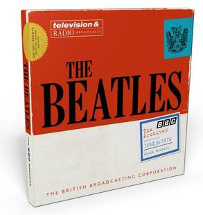The Beatles: The BBC Sound Archives 1962-1970 by Kevin Howlett

BBC Books / Random House 2013. ISBN 9781849906883.
In February 1962, The Beatles arrived at the BBC for a radio
audition. By 1963 they had changed the world forever and even though
their last public performance was just a few years later, fifty
years on they are still regarded as being the one thing that had the
greatest influence in changing not only post-war Britain, but much
of the western world. Four lads from Liverpool - John Lennon, Paul
McCartney, George Harrison and eventually Ringo Starr - changed
music, dress, hairstyles, everything as a new generation called
teenagers emerged from the baby boom around the world following the
ceasing of hostilities.
These teenagers wanted a different world and had the disposable
income to get it, and The Beatles with their remarkable moptop
hairdos, were the impetus. When the BBC brought them from the clubs
of Hamburg in Germany and the infamous Cavern Club in Liverpool to
mainstream media, it gave those teenagers what they were looking
for. With 275 unique musical performances by The Beatles on the BBC,
the core of British entertainment at the time, between March 1962
and June 1965, and the audience exposed to 88 different songs in
this time, their unique sounds, unmistakeable accents and lively
banter literally became the soundtrack of the generation. It was a
time of change and optimism and The Beatles spearheaded that. When
they spoke about political upheaval, radical intolerance and other
confronting issues, a generation listened and acted and the result
was significant social change at a speed and depth never before
seen.
This beautifully presented book is an album of rare and familiar
photos, transcripts of interviews, documents and commentary which
trace the group's relationship with the BBC through those heady days
of Beatlemania and beyond to the notorious introduction of Yoko Ono
into John's life (which Ringo recently confirmed as being a trigger
in the group's breakup) to Paul's announcement that he would not be
returning to the group after his solo was released in April 1970.
The key inquiry questions for the Year 10 history strand of the
Australian Curriculum are:
'How did the nature of global conflict change during the twentieth
century?
What were the consequences of World War II? How did these
consequences shape the modern world?
How was Australian society affected by other significant global
events and changes in this period?'
Within these, there is a specific strand of 'Popular Culture (1945 -
present)' which focuses on the influences of music, film and
television and which, in turn, brings in fashion, technology (the
portability of music through the invention of the transistor radio
was critical), attitudes to sex and drugs, the demand for peace and
a host of other things which are the foundation of the lives our
students lead today. Given The Beatles' critical role in these
changes, this book is an essential part of the support materials
which must accompany this element of the curriculum.
However, it is not limited to the history faculty. Talk to anyone
who was a teenager of the times and they will tell you of the
controversies that surrounded the group, such as the banning of the
track Lucy in the Sky with Diamonds because its title
emphasised LSD, a popular hallucinogenic of the time and you will
open up a range of topics for discussion and debate comparing then
with now. Explore the lyrics of the songs and discover why they have
become anthems for several generations. Examine the influence their
group structure and their music had on other musicians . . . the
possibilities of across-curriculum perspectives are endless.
This is a resource that has to be in your secondary collection.
Barbara Braxton